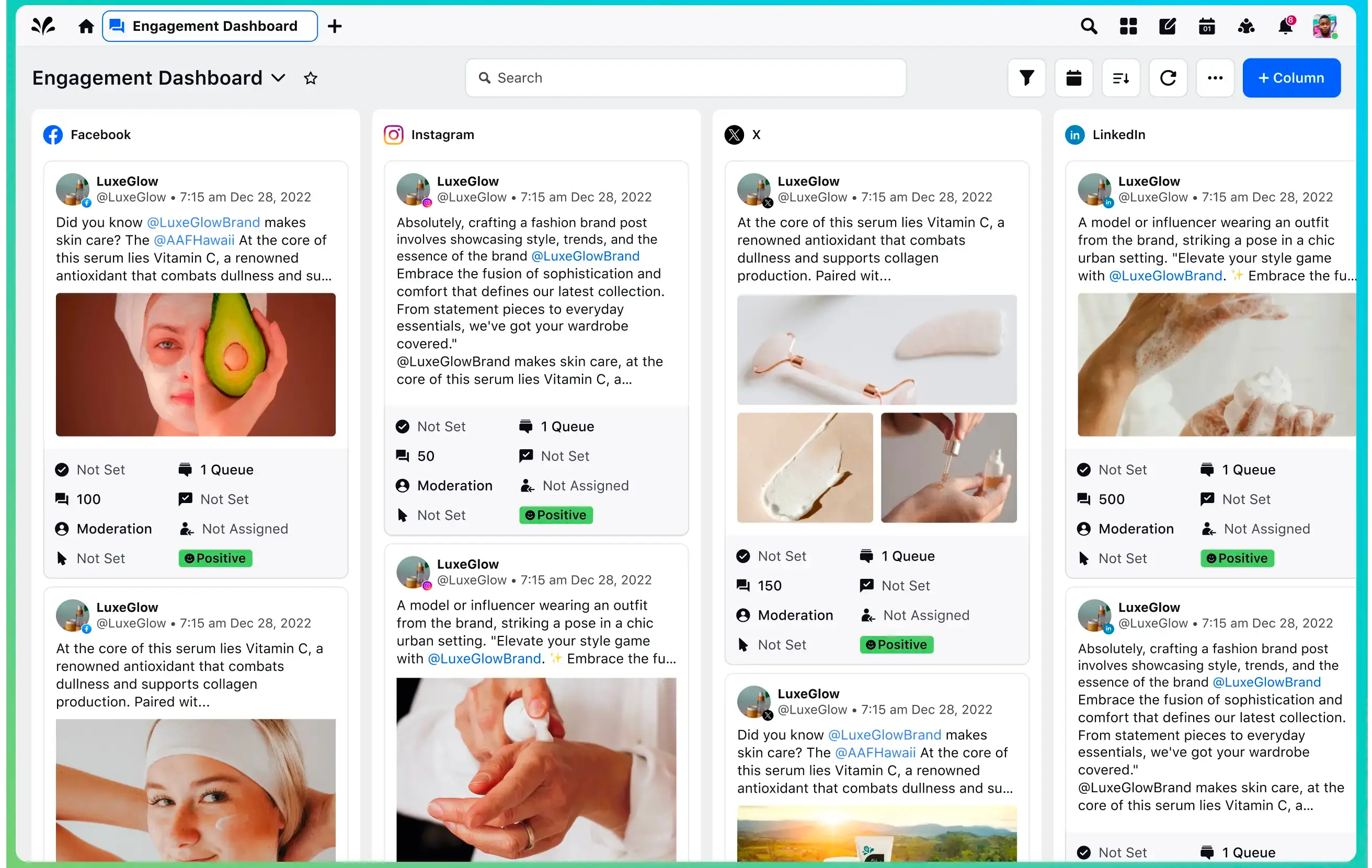The undisputed leader in social media management
For over a decade, the world’s largest enterprises have trusted Sprinklr Social for its in-depth listening, unmatched channel coverage, enterprise-grade configurability and industry-defining AI.

How to unleash the power of your social media analyst to improve your brand's success
A social media analyst is an integral part of your brand's social team, but do you know what they should really be doing to help you achieve success?
Here's a closer look at the role of a social media analyst and how you can get them to where they need to be.
- Demystifying the role of a social media analyst
- The 7 vital responsibilities of a social media analyst
- The unseen value of a social media analyst for business growth
- What does it take to be a successful social media analyst?
- The distinction between social media analysts and managers
- What tools should a social media analyst use?
- Ways social media analysts drive business growth?
Demystifying the role of a social media analyst
A social media analyst is not just a data cruncher; they're a master of the art and science of social media. They help gather valuable insights from social media data to drive decision-making on your brand's social strategy. Social media analysts keep a close eye on key metrics and KPIs to optimize your social media goals, ensuring that your brand stays on track.
The 7 vital responsibilities of a social media analyst
The responsibilities of a social media analyst go far beyond tracking metrics. They include:
- Identifying the right metrics: One of the most critical tasks for your social media analyst is to identify the right metrics to track that are aligned with your business goals. This requires a deep understanding of your target audience and what they care about, as well as your overall social media strategy. The metrics can include engagement rates, reach, impressions, conversion rates, sentiment analysis and more, depending on your specific goals.
- Setting up robust reporting processes to gather data: Once you've identified the right metrics, the next step is to set up a robust reporting process to gather data from all your social media channels. This can include setting up analytics tools and dashboards that enable you to track your performance across different channels and get a holistic view of your social media efforts.
- Regularly tracking metrics and analyzing the data: Social media is a fast-moving landscape, and staying on top of your performance metrics is critical. Your social media analyst should regularly track and analyze data from your social media channels to identify trends, patterns and insights that can inform your social media strategy.
- Presenting the insights to stakeholders: Once you've analyzed the data, the next step is to present the insights to stakeholders in a clear, concise and actionable manner. This can involve creating reports, presentations and visualizations that effectively communicate the data and insights to different stakeholders, such as senior leadership, marketing teams and sales teams.
- Providing regular updates to leadership: In addition to presenting insights to stakeholders, your social media analyst should also provide regular updates to leadership on the most critical metrics. This ensures that the top management is up-to-date on the performance of your social media strategy and can make informed decisions based on the data.
- Benchmarking your brand's social performance: Your social media analyst should also benchmark your brand's social media performance against your competitors. This involves analyzing your competitors' social media strategies and performance metrics to identify areas where your brand can improve and gain a competitive advantage.
- Keeping a finger on the pulse of customer sentiment: Finally, the social media analyst should always keep a finger on the pulse of customer sentiment about your brand on social media. This involves monitoring social media channels for mentions of your brand, tracking customer sentiment and feedback, and identifying opportunities to engage with your audience and build stronger relationships.
The unseen value of a social media analyst for business growth
As the saying goes, "You can't improve what you don't measure," and this is especially true when it comes to a business's social media presence. That's where a social media analyst comes in, bridging the gap between data and strategy to help you achieve your social media goals.
Investing resources in social media is a must for any organization, but without visibility into how it's being utilized and its impact on objectives, it can feel like throwing resources into a black hole. A skilled social media analyst helps shine a light on the metrics that matter most and provide actionable insights that can inform and steer social media activities going forward, ultimately driving business growth.
What does it take to be a successful social media analyst?
A social media analyst needs to have a deep understanding of data analysis and the ability to draw insights from it. Being able to dive into data and extract meaningful information is a key component of the role. It is also essential to have a strong understanding of the various social media channels, their nuances and the different types of data they provide. This knowledge allows them to interpret and make sense of the data accurately and effectively.
A skilled social media analyst possesses a scientific mindset and has a natural curiosity to understand data in detail. This approach enables them to identify patterns and trends that can shape a brand's social media strategy. They’re also proactive in providing insights and recommendations based on data analysis, helping steer the team towards achieving their goals.
The distinction between social media analysts and managers
While both roles are essential to a successful social media strategy, the responsibilities of a social media analyst and a social media manager differ significantly. A social media analyst is laser-focused on the performance of the brand's social channels, analyzing data to derive insights and devising strategies to optimize results. They typically do not have direct involvement in the creation or execution of social media content, which falls under the purview of the social media manager.
The social media manager has end-to-end responsibility for the brand's social channels, from content creation and scheduling to engagement with followers and reporting on performance. They collaborate with social media analysts to ensure that their content strategy is informed by data and aligned with business objectives.
In some cases, a social media manager may also take on the responsibilities of a social media analyst, but for optimal results, it's best to have dedicated professionals in each role who can bring their specialized skills and expertise to the table.
What tools should a social media analyst use?
A social media analyst’s job is to make sense of the vast amount of data coming from various social channels. But let's face it, combing through all that data can be a real headache. That's why your social media analyst needs the right tools to help you consolidate and analyze all that information.
First and foremost, a spreadsheet is a must-have tool. But to take your social media analyst’s analysis to the next level, you need a platform that can gather data from all those different social channels and present it in one place. That way, your analyst can spend less time cleaning and organizing data and more time extracting insights.
Another crucial tool is a platform for listening to the voice of the customer. This will help them keep track of user needs and identify any abnormal activity or potential crises. With this information, they can alert the social team in real time and prevent any damage to your brand's reputation.
Once they've crunched the numbers and identified insights, it's time to present their findings to stakeholders. A presentation software is the perfect tool to create compelling visuals that will help guide their decision-making.
Choosing the right tools is essential to maximize the impact of your social media analyst. By utilizing a unified reporting and analytics platform, analysts can derive better insights, analyze data more effectively and suggest better strategies to help your business grow.
Ways social media analysts drive business growth?
Social media platforms increase brand reach and awareness, which can lead to more leads and conversions. Social media analysts play a critical role in this process.
- Social Media Strategy: A social media analyst helps a business evaluate its social media strategies by monitoring performance metrics to identify what works best for that brand. This information can be used to shape a content strategy that maximizes reach. The best-performing content can then be used for ad campaigns to achieve a better return on investment.
- Voice of the Customer: They make use of tools to understand what customers are saying about the brand, their sentiment towards it and any complaints or issues they might have. This helps businesses address these concerns proactively and shape future product strategies based on customer feedback, which can unlock new growth opportunities.
- Crisis Management: They can avert crises by monitoring customer conversations online by actively watching for any spike in negative sentiment and alerting the team before the crisis escalates. This allows the team to prepare and address it in a timely manner.
Competitor Benchmarking: Finally, social media analysts can help businesses evaluate how their competitors are doing online, learn from their successes and mistakes, and benchmark their brand performance with others in the market. This information is valuable for preparing to take on competition and driving growth.
